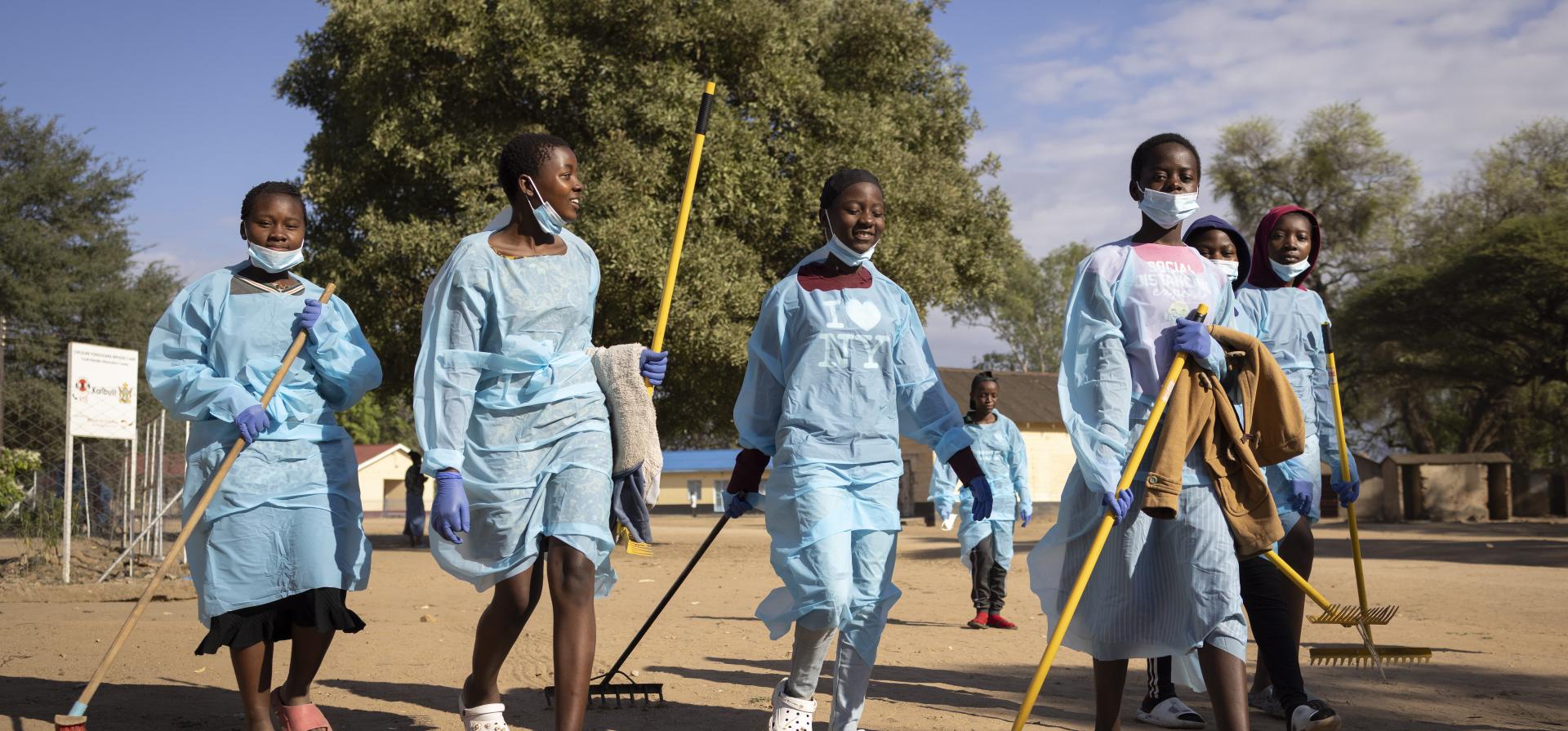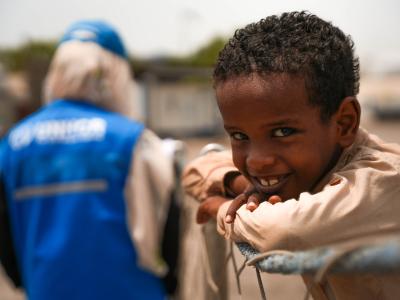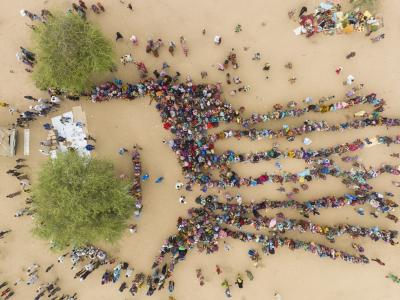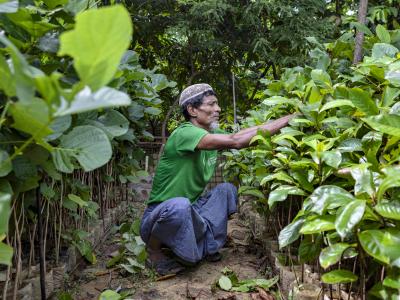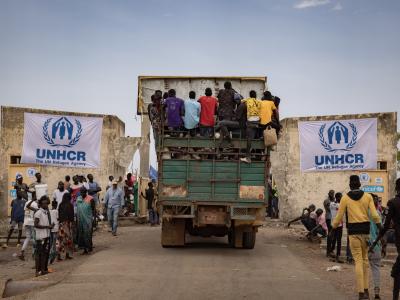Regional overview
At the end of 2023, there were 10 million forcibly displaced people and returnees in southern Africa, most of whom were internally displaced by conflict in the Democratic Republic of the Congo (DRC) and Mozambique. The region also hosted around 1 million refugees and asylum-seekers, mainly from Burundi, the Central African Republic, the DRC, Rwanda and South Sudan. In addition, throughout the year, 1 million people across southern Africa were forced from their homes by extreme weather events, including Tropical Cyclone Freddy, which devastated communities in Malawi and Mozambique, and record flooding of the Congo River.
Displacement exposed families to risks as varied as gender-based violence, lack of registration and asylum restrictions, and economic inequality and fragile government systems compounded the stresses experienced by people forced to flee and their host communities. The region also struggled with outbreaks of measles, cholera and malaria, and underfunding of the humanitarian response resulted in food ration cuts and increased food insecurity levels.
UNHCR and its partners delivered life-saving assistance and sought to enhance refugees’ self-reliance. In 2023, 80,800 individuals received cash assistance in 10 countries; over 90,000 refugee children (48% of them girls) were supported to go to school; and 413 scholarships were awarded to refugees through the Albert Einstein German Academic Refugee Initiative (DAFI) programme. UNHCR bolstered youth initiatives in Malawi, Mozambique and Zimbabwe, while Angola, South Africa and Zimbabwe integrated refugees into their national child protection systems.
Together with the World Bank, UNHCR implemented insect-farming projects in Malawi and Zimbabwe to promote livelihoods and improve food security. Moreover, UNHCR, the Southern Africa Development Community and the African Development Bank partnered to strengthen the inclusion of refugees in national and regional development plans and to promote the effective management of climate change challenges.
As intense conflict in the DRC produced an unprecedented level of gender-based violence, leading 24 UN entities to urge immediate action to protect women and girls, UNHCR collaborated with a women-led organization to provide psychosocial care and legal assistance for survivors and those at risk. UNHCR also built shelters, issued relief kits and coordinated protection, shelter and site management to assist those who were internally displaced by the crisis. Outside of the DRC, UNHCR led the 2023 DRC Regional Refugee Response Plan, working with 69 partners to respond to the needs of Congolese refugees in Angola, Burundi, the Republic of the Congo, Rwanda, Uganda, the United Republic of Tanzania and Zambia.
In Mozambique, UNHCR’s protection monitoring interviewed 134,000 people in Cabo Delgado, and almost one in three reported not having any civil documentation. UNHCR worked with the Government and the Catholic University of Mozambique to provide birth certificates, identity documents and legal aid across the country. UNHCR also provided mental health and psychosocial support to 11,700 displaced people, including elderly people at risk and people with disabilities.
UNHCR pressed States to keep the path to asylum open and to include forcibly displaced people in their national systems. In 2023, the DRC developed a simplified refugee status determination procedure, and Angola resumed the verification of refugees and asylum-seekers, following a suspension in 2015.
UNHCR’s work on statelessness was robust. Advocacy with national statistics agencies in the Republic of the Congo, South Africa, Zambia and Zimbabwe led to the incorporation of proxy statelessness questions in their respective census questionnaires. Moreover, engagement with authorities in the Republic of the Congo supported the country’s accession to the statelessness conventions.
UNHCR developed a regional strategy to strengthen protection of people who had been forced to flee along the migration route from the Horn of Africa to South Africa, encompassing support for States to address asylum cases among people on the move, legislative reforms, and the revitalization of the UNHCR-IOM task force on mixed movements.
UNHCR submitted more than 9,000 people for resettlement consideration in 2023, compared to 6,839 in 2022, and supported 3,600 to depart, up from 3,000 in 2022. On the other hand, during 2023 UNHCR could support the voluntary repatriation of only 11,000 refugees, compared to 21,100 in 2022 – reduced funding affected activities, and pendular movements of returnees were observed due to the resurgence of violence in areas of return in the DRC.
Regional expenditure and budget
$178 million spent against a budget of $472 million
$293 million of unmet needs or 62% of the budget
Population overview
Financial overview
Trends in response
Multisectoral monitoring results
Protection

Child protection

Accountability to
affected populations

Basic needs


Shelter

Health



Nutrition

2.1 million people received protection services*
2022 result: 1.9 million
*Protection services encompasses a vast range of community-based, individual and household interventions in various domains of UNHCR protection work, including counselling and information on rights, sensitization on protection issues, community outreach and mobilization, specialized services for children or other persons with specific needs, GBV programming, legal assistance, registration and documentation, Refugee status determination and resettlement case-work, protection monitoring.
1.1 million children received protection services*
2022 result: 935,900
67% of countries in the region had child protection services available to forcibly displaced and stateless children
*Child protection services include support through Best Interests Procedures for children at risk, targeted support for children with specific needs and children in alternative care, support through family tracing and reunification, and reintegration support for children associated with armed groups and forces.
38% of reporting countries had a multi-channel feedback and response system that was designed based on consultations with forcibly displaced and stateless people
2022 result: 60%
80,800 people received cash assistance
2022 result: 55,400
401,000 people received non-food items including core relief items*
Indicator not available in 2022
*This indicator reflects the total number of people who benefited from the direct distribution of in-kind non-food items, including domestic Core Relief Items (CRIs) and excluding shelter CRIs.
129,000 people received shelter and housing assistance*
Indicator not available in 2022
*Shelter and housing assistance includes emergency, transitional and durable shelter provision, collective shelter, shelter repair and maintenance, and rental programming.
513,000 people received essential health care services
2022 result: 506,400
56,000 women and girls received sexual and reproductive health services*
2022 result: 62,000
*Sexual and reproductive health services include antenatal care, assisted delivery, postnatal care, family planning services and health services for survivors of gender-based violence.
11,000 people received mental health and psychosocial support services
2022 result: 12,600
4,700 children 6-59 months were admitted for treatment of moderate acute malnutrition (MAM)
2022 result: 4,900
2,000 children 6-59 months were admitted for treatment of severe acute malnutrition (SAM)
2022 result: 3,000
Situations
Central African Republic situation
Democratic Republic of the Congo situation
Operations*
Democratic Republic of the Congo | Malawi | Mozambique | Republic of the Congo | South Africa Multi-Country Office | Zambia
*The operations listed above are the ones with annual results reports available on Global Focus for 2023.
